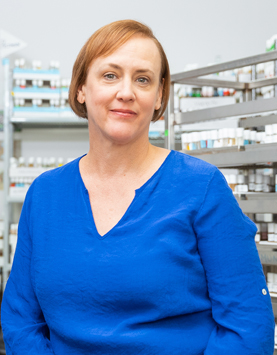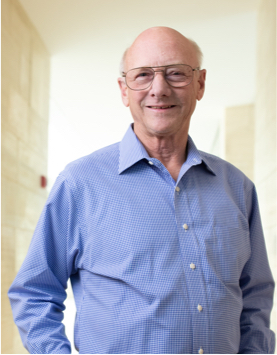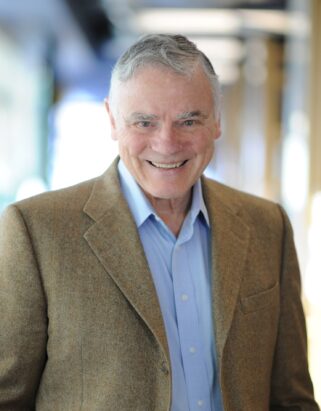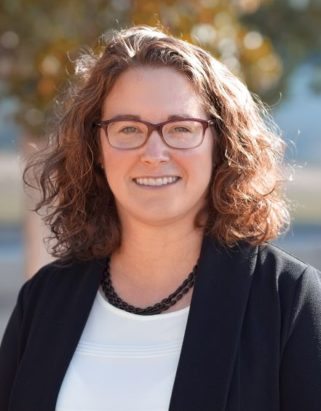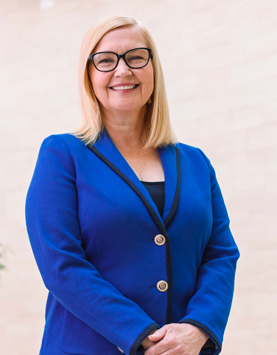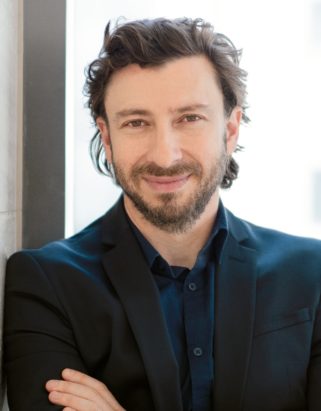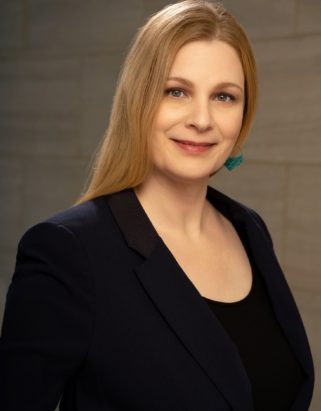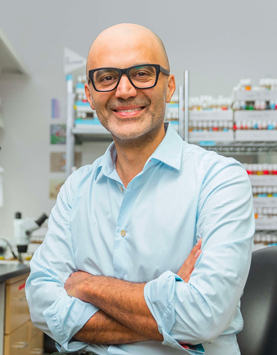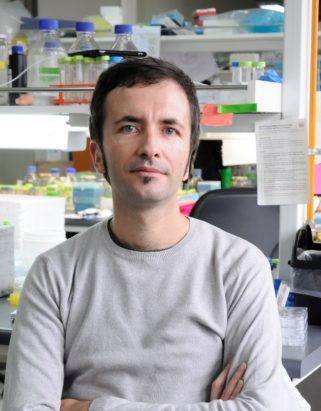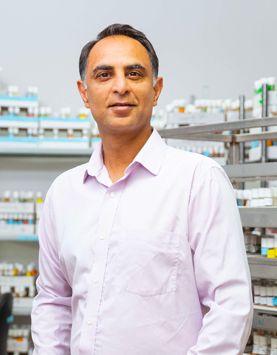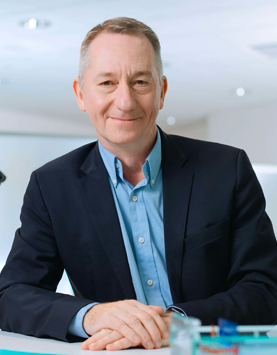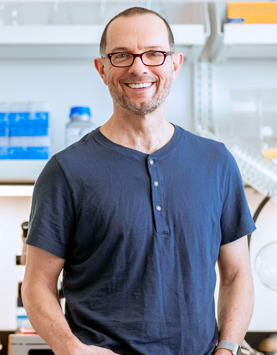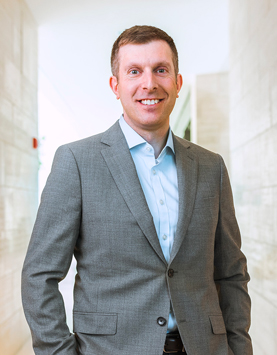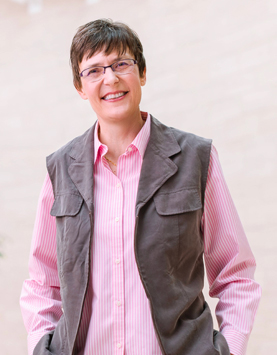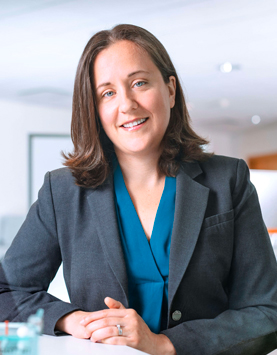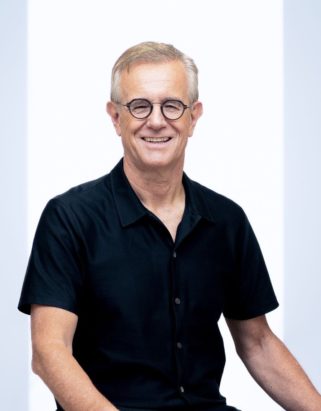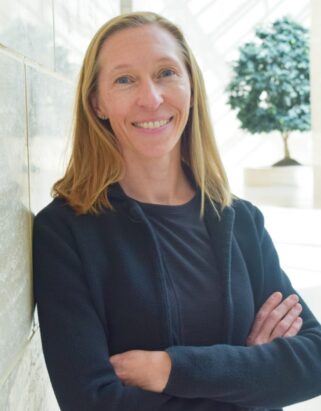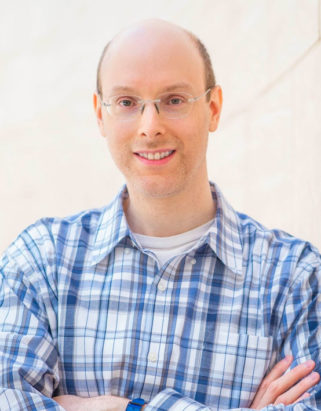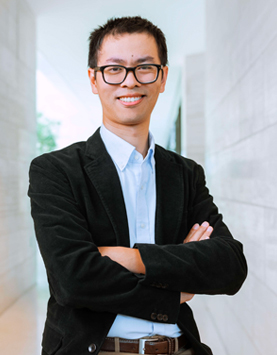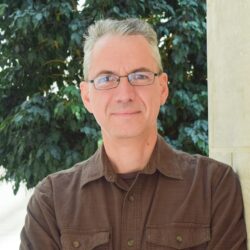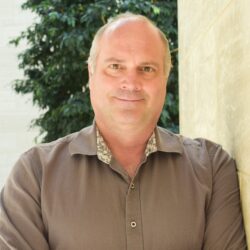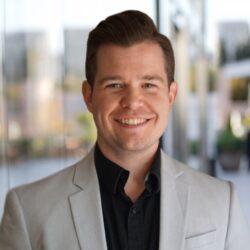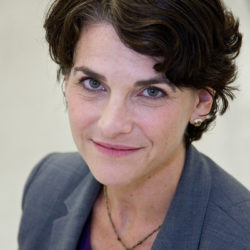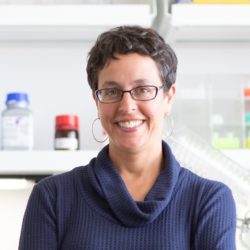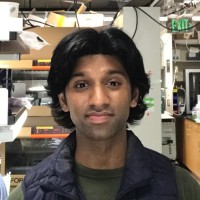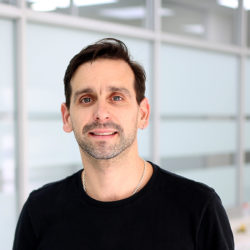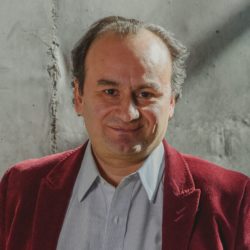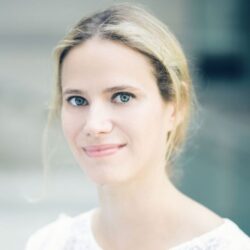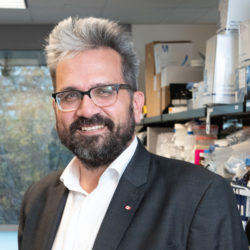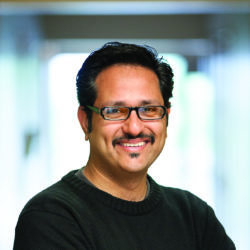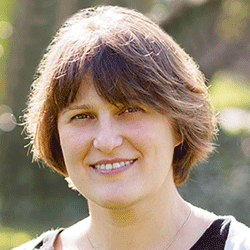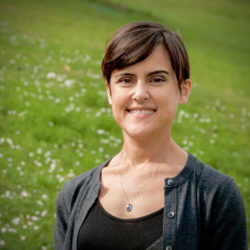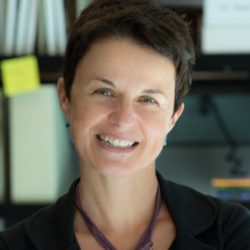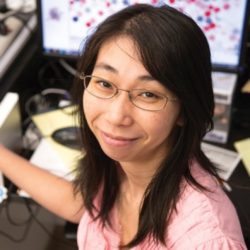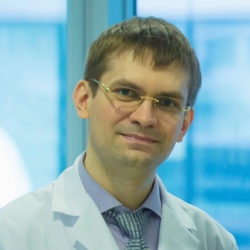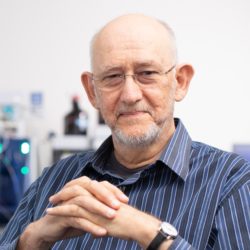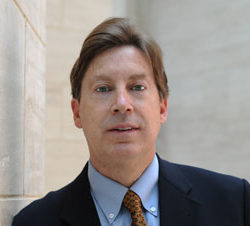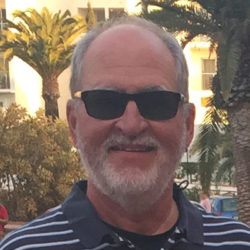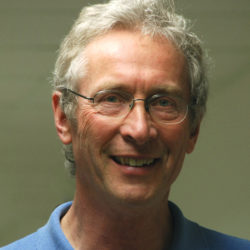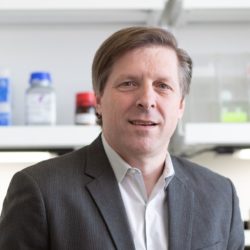
A rather disruptive bunch
The Buck Institute’s 24 principal investigators share the audacious notion that biological aging is malleable. Some of our scientists have been here since the Institute opened its doors; others are newcomers. They all bring their specific areas of expertise to collaborations intended to push the boundaries of scientific inquiry.
Akos Gerencser, MD, PhD
Director of the Morphology and Imaging Core and Research Associate Professor
Michelle Arkin, PhD
Professor, Pharmaceutical Chemistry, University of California, San Francisco
Co-Director, Small Molecule Discovery Center, UCSF
Member, Helen Diller Family Comprehensive Cancer Center, UCSF
Adjunct Professor, Buck Institute for Research on Aging
Michelle’s research focuses on developing first-in-class chemical probes and drug leads for novel therapeutic targets in age-related diseases such as cancer and neurodegeneration. Her lab is particularly interested in using small-molecule and protein tools to dissect protein-protein interaction networks relevant to disease. Michelle also co-directs the UCSF Small Molecule Discovery Center (SMDC), which includes high-throughput screening, fragment-based lead discovery, and medicinal chemistry. In a typical year, the SMDC works with more than a dozen academic and pharmaceutical labs to develop novel screening assays and discover starting points for chemical biology and drug discovery.
Michelle is deeply involved in the Academic Drug Discovery community. She is the President of the Academic Drug Discovery Consortium and represents UCSF in the National Cancer Institute’s Chemical Biology Consortium and the Accelerating Therapeutics for Opportunities in Medicine (ATOM) consortium; she is also an investigator in the Rainwater Foundation’s Tau Consortium. Michelle is on the editorial boards for the Assay Guidance Manual and Current Protocols in Chemical Biology. Prior to UCSF, Michelle was a founding scientist at Sunesis Pharmaceuticals, where she helped discover and develop the anti-inflammatory drug lifitigrast (developed by SARcode/Shire), and anti-cancer experimental therapeutic vosaroxin (Sunesis).
Rachel Brem, PhD
Adjunct Associate Professor
Dr. Brem is an associate professor and the faculty director of the Bioinformatics Core at the Buck Institute. She earned a PhD in biophysics from University of California, San Francisco, and did postdoctoral research at the Fred Hutchinson Cancer Research Center in Seattle, Washington. Before joining the Buck Institute, she held a faculty position at University of California, Berkeley, where she retains an adjunct appointment.
Dr. Brem is a geneticist and genomicist working at the interface between computation and experiment. She has been the recipient of a Burroughs-Wellcome Career Award, an Ellison New Scholar in Aging Award, and a Glenn Award for Research in Biological Mechanisms of Aging.
Pranam Chatterjee, PhD
Adjunct Assistant Professor
Dr. Pranam Chatterjee is an Assistant Professor of Biomedical Engineering at Duke University. Dr. Chatterjee's research exists at the interface of computational design and experimental engineering, specifically employing state-of-the-art machine learning methods to engineer programmable proteins for applications in genome, proteome, and cell engineering. A PhD graduate of the MIT Media Lab, he developed robust genome editing technologies that represent some of the broadest, safest, and most effective CRISPR enzymes to date. More recently, Dr. Chatterjee’s research has extended to the emergent field of “proteome” editing, where his team has leveraged structure and sequence-based design to engineer potent peptide fusions that target and degrade pathogenic proteins, including those implicated in viral diseases and cancer. His team’s established expertise in machine learning has been further applied to develop transcription factor-based stem cell differentiation protocols for ovarian cell types, including granulosa cells and oocytes. Overall, his long-term goals are two-fold: (1) Enable the de novo design of protein effectors for any biological purpose; (2) Leverage these platform technologies to prolong and promote reproductive longevity and equality.
Dr. Chatterjee is very passionate about translating his academic research to the clinic as efficiently as possible. As such, he has co-founded two companies, UbiquiTx, Inc. and Gameto Inc., which are building upon his foundational research to develop novel protein-based cancer therapeutics and fertility solutions, respectively. Most importantly, Dr. Chatterjee believes in the power of conducting impactful science in a diverse, inclusive, and supportive environment. He has been determined and active in creating academic and community environments not only welcoming, but also responsive to the needs of minorities, women, and socioeconomically underprivileged students.
Felipe Court, PhD
Professor, Center for Integrative Biology, Universidad Mayor de Chile
Adjunct Professor, Buck Institute
Felipe A. Court received his PhD at Edinburgh University under the supervision of Dr. Peter Brophy and Dr. Richard Ribchester, working on fundamental parameters that regulates conduction velocity in the nervous system. During this time, Court was awarded with the UK best PhD by the British Neuroscience Association. Under an EMBO postdoctoral fellowship he then worked in demyelinating conditions and in vitro models for neuron-glia interaction in the laboratories of Dr. Laura Feltri and Dr. Larry Wrabetz at the San Raffaele Scientific Institute, Milano. In 2008, Court joined the Department of Physiology at Catholic University in Chile to study transfer of genetic material between glial cells and neurons. In 2016, Court moved to Universidad Mayor (Chile) as a Full Professor and become Director of the Center for Integrative Biology, and principal investigator of the Center for Geroscience, Brain health and Metabolism (GERO). In his lab, Court is working with mouse models of neurodegenerative conditions, including Alzheimer’s and Parkinson, as well as glia-derived inflammatory events in the CNS during ageing, studying the molecular mechanisms associated to axonal degeneration. In addition, his group is studying transfer of genetic material (mRNA and miRNA) from glia to neurons via exosomes, and the impact of this process in axonal regeneration and senescence.
felipe.court@umayor.clChristian Gonzalez-Billault PhD
Professor, Faculty of Sciences and Faculty of Medicine, Universidad de Chile
Director, Geroscience Center for Brain Health and Metabolism (GERO)
Adjunct Professor, Buck Institute for Research on Aging
Christian Gonzalez-Billault was initially trained in Biochemistry at Universidad de Chile. He then received his PhD in Cell and Molecular Biology at the Molecular Biology Center Severo Ochoa in Madrid, Spain under the supervision of Jesus Avila. After that he received an award from the Madrid Province to perform a postdoctoral fellow in Madrid. In 2003, he joined the Department of Biology, Faculty of Science, Universidad de Chile where he is currently Full Professor. He recently received a partial appointment at the Department of Neuroscience, Faculty of Medicine, Universidad de Chile. He is also the Director of the Geroscience Center for Brain Health and Metabolism (GERO), an aging center funded under the Priority Areas Program of the Chilean Commission for Science and Technology Research. He was also the President of the Chilean Society for Biology, the oldest and more traditional scientific society in the country. He directed the Cell Molecular and Neuroscience PhD Program at Universidad de Chile. He was part of the Frontiers in Science group at the Chilean Academy of Sciences.
In his lab, Gonzalez-Billault is interested to understand the role of cytoskeleton proteins in neuronal functions, including physiological and pathological aspects. He initiated a successful series of biennial workshop entitled “Emerging Concepts of the Neuronal Cytoskeleton” that was held in 2011, 2013, 2015, 2017 with an additional workshop programmed for 2019. The series had been funded by EMBO, IUBMB, ISN amongst others.
Currently, Gonzalez-Billault research is focused in understanding the effects of aging on brain cells, including neurons and glial cells. We are using neurons produced from skin cells to model aging in vitro; and we are interested to understand the functional and metabolic coupling of astrocytes and neurons during normal aging and in nervous system pathologies. We are also assessing the consequences of senescence in neuronal morpho-structure and functions.
Emily G. Jacobs, PhD
Associate Professor, University of California, Santa Barbara Department of Psychological and Brain Sciences
Adjunct Senior Research Scientist, Sansum Diabetes Research Institute
Dr. Jacobs received her Ph.D. from UC Berkeley and her B.A. from Smith College. Prior to UCSB, she was an Instructor at Harvard Medical School and the Department of Medicine/Division of Women's Health at Brigham & Women's Hospital. She is the recipient of a Brain and Behavior Young Investigator Award, a Robert Wood Johnson Foundation Health and Society Scholar Award, a K12 NIH Career Development Award, and was named a National Academy of Sciences Frontiers of Science Fellow for “distinguished young scientists under 45.” In addition to her research, Dr. Jacobs Lab advocates for diversity in science at the national and international level. Her lab regularly partners with K-12 groups to advance girls’ representation in STEM, work that was featured in the book “STEMinists: The Lifework of 12 Women Scientists and Engineers”.
Nevan J. Krogan, PhD
Professor, Department of Cellular and Molecular Pharmacology
Senior Investigator, Gladstone Institute for Data Science and Biotechnology
Director, Quantitative Biosciences Institute at UCSF
Director, QB3@UCSF, California Institute for Quantitative Biosciences
Director, Thermo Fisher Scientific Proteomics Facility for Disease Target Discovery
Faculty, Cancer Genetics, Helen Diller Family Comprehensive Cancer Center, UCSF
Adjunct Faculty, Sanford Burnham Prebys Medical Discovery Institute
Adjunct Faculty, Buck Institute for Research on Aging
Nevan Krogan is an expert in the field of systems biology and is known for extracting biological mechanism and insight from large-scale biological datasets. Research in the Krogan lab focuses on fundamental biological mechanisms, because cures to many diseases have been revealed by unexpected discoveries in the basic sciences. One of the new approaches developed is reflected in a variety of ‘Cell Mapping Initiatives’, which we apply to many biological or biomedical problems, including infectious diseases (HPMI), cancer (CCMI) as well as neurological and psychiatric disorders (PCMI). In these projects, we create cell maps by comprehensively identifying the protein complexes that work together to ensure healthy cell physiology. Using this information, we study how disease mutations or infections adversely change these protein networks and, ultimately, how drugs or other treatments can overcome these changes. We strongly believe that the best science will be done by diverse groups of scientists coming from different disciplines, which is why we are working in close collaboration with experts from different disciplines on all of our projects. Complementing technologies that allow the unbiased study of protein abundance, protein modifications, and the effects of gene deletions help us inform targeted structural studies, further paving the way to drug development.
During his PhD studies at the University of Toronto under Jack Greenblatt, Nevan developed several experimental systems biology approaches and integrated together the resulting data to interrogate many pathways in budding yeast. During his time as an independent Sandler Fellow at UCSF and then UCSF faculty starting in 2007, he has since extended these approaches to study different disease states in human cells as described above. He is a Searle Scholar, Keck Young Investigator and was recently named one of the top 40 under 40 by the journal Cell. He serves on several journal editorial boards, including Molecular Systems Biology and Cell Systems, and is routinely an organizer of international conferences including meetings in Europe, Asia and the USA. He is also the director and co-director of several NIH-funded Center grants, including the HARC Center (HIV Accessory and Regulatory Complexes), the Cancer Cell Map Initiative (CCMI), the Host Pathogen Map Initiative (HPMI) and the Psychiatric Cell Map Initiative (PCMI).
Deepak A. Lamba, MBBS, PhD
Associate Professor, Department of Ophthalmology UC-San Francisco
Adjunct Professor, Buck Institute
The Lamba lab focuses on retinal repair following inherited and age-associated degeneration and modeling disease-in-a-dish using stem cells technologies. Dr. Lamba’s lab has developed in vitro methodologies for generating all the various retinal cell types, including retinal neurons and retinal pigment epithelium cells, from both human and mouse embryonic stem cells and induced pluripotent stem cells. The research is primarily focused on (1) exploring the potential and challenges in retinal repair and (2) using in vivo models and stem-cell based in vitro model systems to understand various retinal degenerations. Dr. Lamba started his lab at the Buck Institute for Research on Aging in 2011 as an Assistant Professor. His work has been published in top-tier journals including Science, Nature-Metabolism, Cell-Stem Cells and PNAS. In 2018, Lamba lab moved to UCSF’s Department of Ophthalmology and is currently housed at the Eli and Edythe Broad Center of Regeneration Medicine and Stem Cell Research to focus on novel stem cell-based retinal therapies and bringing them closer to the clinic. Dr. Lamba continues to collaborate with faculty at the Buck Institute.
Deepak.Lamba@ucsf.eduPolina Lishko, PhD
Adjunct Associate Professor, Buck Institute
Associate Professor of Cell and Developmental Biology, Department of Molecular and Cell Biology, University of California, Berkeley
Polina V. Lishko, PhD is an Associate Professor in the Molecular and Cell Biology Department at the University of California, Berkeley and also holds an Adjunct Associate Professor appointment at the Center for Reproductive Longevity and Equality (CRLE) at the Buck Institute for Research on Aging. She received her PhD in Biophysics from the National Academy of Sciences of Ukraine in 2000, where she studied the molecular mechanisms of neurodegeneration and memory. She did her postdoctoral fellowship at Harvard Medical School, and later at Harvard University working on molecular mechanisms of light perception in the eye, and later she studied structure-function relation of the heat-activating TRPV ion channels- the receptors for pain and temperature. From 2006 to 2011, Dr. Lishko was an instructor at the University of California, San Francisco, where she studied the function of ion channels in reproduction and the role of mitochondrial ion transporters in thermogenesis. In 2012, she became a faculty at the University of California, Berkeley, where her team studies the physiology of steroid signaling and how membrane steroid receptors regulate mammalian reproductive and neuronal functions, and control ovarian aging.
In 2018 Dr. Lishko co-founded YourChoice Therapeutics (YCT), the startup company which aims to improve women’s reproductive health by developing a new generation of on-demand nonhormonal contraceptives. Between 2018 and late 2019 Dr. Lishko served as a scientific advisor for YCT, and recently left the company to return to her academic activities.
Dr. Lishko research is currently funded by NIH and has also been funded by March of Dimes and various private foundations. In addition to being a Pew Biomedical Scholar and a Sloan Fellow, Dr. Lishko has received Margaret Oakley Dayhoff Award in Biophysics. She has served as a research mentor for numerous postdoctoral fellows, graduate, and undergraduate students. Dr. Lishko authored more than 40 peer-reviewed publications, wrote 2 book chapters, and is an inventor on 5 patents. She was a lecturer in Frontiers in Reproduction course taught at Marine Biology Lab, Woods Hole, served on NIH/NICHD study sections and serves as an Editorial Advisory Board member for eLife, Plos Biology, the Journal of General Physiology, and Bioelectricity. A member of American Society of Andrology since 2012, she received Matthew P. Hardy Young Andrologist award and was elected to serve as the Society Council Member.
Shona A. Mookerjee, PhD
Adjunct Associate Professor and Research Scientist, Buck Institute for Research on Aging
Associate Professor, Touro University
Dr. Mookerjee received her PhD in molecular genetics from the University of Rochester. She trained as a postdoctoral fellow at the Buck Institute until 2013, when she took a faculty position at Touro University California and an adjunct faculty position at the Buck Institute. She teaches in the Department of Biological and Pharmaceutical Sciences at Touro and conducts research in the Brand lab, where she also trains undergraduate and graduate students. Her work is focused on understanding the energetic budgeting of cells and the ways in which energy production and consumption affect cellular behavior in health, disease, and aging. Current projects include the role of ATP production in cellular differentiation and transformation and the characterization of the pathways that consume ATP during these processes. Dr. Mookerjee is also a lecturer in the Bioenergetics Master Class led by David Nicholls and Martin Brand.
SMookerjee@buckinstitute.orgMelanie Ott, MD, PhD
Senior Investigator, Gladstone Institute of Virology and Immunology
Professor, University of California, San Francisco, Department of Mediicine, School of Medicne.
Adjunct Faculty, Buck Institute
A native of Germany, Melanie Ott is a senior investigator at Gladstone Institutes, as well as a professor of medicine at UC San Francisco (UCSF). She is passionate about using viruses to find fundamental new biology in host cells. Known for her studies of the HIV Tat protein and viral latency, she also discovered a critical role of lipid droplets in hepatitis C virus (HCV) infection and defined how protein acetylation regulates T cell function. Her research is relevant for efforts to eradicate HIV from patients, to alleviate fatty liver disease in chronic HCV infection, and suppress autoimmunity in patients with Type 1 Diabetes. She recently shifted part of her research efforts to study the new SARS-CoV-2 virus that causes COVID-19.
Prior to joining Gladstone in 2002, Ott started her own research group at the German Cancer Research Center (DKFZ) in Heidelberg, Germany. She earned an MD from the University of Frankfurt/Main in Germany, and a PhD in molecular medicine from the Picower Graduate School in Manhasset, New York. She is a member of the Association of American Physicians and a Fellow of the American Academy of Microbiology. She is also a recipient of the Chancellor’s Award for Public Service from UCSF for her community student outreach work at Gladstone. Ott also helped establish the PUMAS (Promoting Underrepresented Minorities Advancing in the Sciences) internship program at Gladstone, which seeks to increase diversity in STEM and won the Educator of the Year award from the California Life Science Association.
Christina Yau, PhD
Adjunct Associate Professor
Dr. Christina Yau, Ph.D., is a bioinformatics scientist specializing in the analysis of high-dimensional molecular (e.g. transcriptomic) data to address important issues in translational cancer research. Since 2010, she has been actively involved in the Cancer Genome Atlas (TCGA) program, as an analyst presenting the UCSC-Buck Institute Genome Data Analysis Center (GDAC), performing integrated pathway analysis to further the understanding of the molecular characteristics of multiple cancer types, including breast, endometrial and cervical cancers. She received a co-appointment at UCSF in 2012 to provide bioinformatics and statistical support for major collaborative projects. She serves on the statistics team, the data access and publications committee and biomarker working group of the I-SPY 2 TRIAL, a multi-center phase 2 adaptive neoadjuvant platform trial for high-risk breast cancer patients. In 2016, she became a full-time faculty member at the Department of Surgery at UCSF. She is currently one of the on-study statisticians for the WISDOM trial, evaluating the safety and effectiveness of personalized risk-based breast cancer screening; and is also a key investigator in collaborative projects to identify biomarkers that may inform more targeted and personalized therapeutic approaches and enable within-patient treatment escalation and de-escalation.
Alex Zhavoronkov, PhD
CEO, Insilico Medicine
Adjunct Professor, Artificial Intelligence, Buck Institute
Alex Zhavoronkov, PhD, is the founder and CEO of Insilico Medicine, a leader in the next-generation artificial intelligence technologies for drug discovery, biomarker development, and aging research. At Insilico he pioneered the applications of generative adversarial networks and reinforcement learning techniques for generation of novel molecular structures with the desired properties and generation of synthetic biological and patient data. He also pioneered the application of deep learning techniques for prediction of biological age and utilized these predictors for target identification and drug discovery. He set up the R&D centers in 6 countries including the United Kingdom, Korea, Russia, Hong Kong and Taiwan and launched multiple digital biomarker initiatives including Young.AI. Prior to founding Insilico Medicine, he worked in senior roles at ATI Technologies (acquired by AMD in 2006), NeuroG Neuroinformatics, Haut.AI and established AgeNet.net competitions. He is the co-founder and chief science officer (CSO) of the Biogerontology Research Foundation (BGRF, bg-rf.org.uk, a registered UK charity focusing on age-related diseases. Since 2012 he published over 130 peer-reviewed research papers and 2 books including “The Ageless Generation: How Biomedical Advances Will Transform the Global Economy” (Palgrave Macmillan, 2013). From 2014 to 2018 he presented at over 200 academic and industry conferences. He serves on the editorial boards of Aging, Aging Research Reviews, Frontiers in Genetics of Aging, and co-chairs the Annual Aging Research for Drug Discovery Forum (6th annual in 2019) and the Artificial Intelligence for Healthcare Forum (3rd annual) at the Basel Life, one of Europe's largest industry events in drug discovery. Dr. Zhavoronkov holds two bachelor degrees from Queen’s University, a master’s in Biotechnology from Johns Hopkins University, and a PhD in Physics and Mathematics from Moscow State University. List of academic publications.
Martin Brand, PhD
Professor Emeritus
Dr. Brand was trained in the United Kingdom at the University of Manchester Institute of Science and Technology, where he received his Bachelor of Science, and at the University of Bristol, where he received his PhD. His postdoctoral work was completed at Johns Hopkins University in Baltimore, Maryland, with Professor A.L. Lehninger. Dr. Brand was a faculty member of the Biochemistry Department at the University of Cambridge and then a group leader at the Medical Research Council in Cambridge. He moved his laboratory to the Buck Institute in 2008. Dr. Brand has made major contributions to understanding the mechanisms of energy transformation and the mechanisms of energetic inefficiency and free-radical production and their roles in evolution, physiology, and the diseases of aging.
Dr. Brand has published over 340 scientific papers, which have been cited more than 33,000 times by other scientists. His research has been recognized with the Keilin Medal of the Biochemical Society and a senior scholarship from the Ellison Medical Foundation, and with his election as a fellow of the Academy of Medical Sciences. He serves on the editorial boards of several scientific journals and the scientific advisory boards of various biotech companies.
Dale Bredesen, MD
Professor Emeritus
Dr. Bredesen is a neuroscientist and neurologist, professor and author in the field of neurodegenerative diseases. He was the founding President and CEO of the Buck Institute for Research on Aging, and his laboratory research over 30 years has focused on the mechanisms underlying neurodegenerative diseases such as Alzheimer’s, leading to the first successful reversals of cognitive decline in Alzheimer’s disease, published in 2014, 2016, and 2018. Dr. Bredesen is a prodigious innovator in medicine, with over 30 patents to his name.He has authored over 220 scholarly publications and case studies.
David Greenberg, MD, PhD
Professor Emeritus
David Greenberg received MD and PhD degrees from the Johns Hopkins University School of Medicine and clinical training in internal medicine at New York Hospital-Cornell University Medical Center and in neurology at UCSF. He served on the faculty of the Department of Neurology at UCSF and the Departments of Neurology and Neurobiology at the University of Pittsburgh before joining the Buck Institute as Professor and Vice President for Special Research Programs in 1999. His research has focused on stroke pathogenesis and repair, with emphasis on neuroprotective proteins (VEGF, neuroglobin) and neurogenesis. He was appointed Professor Emeritus in 2016.
DGreenberg@buckinstitute.orgDavid Nicholls PhD, FRS, FRSE
Professor Emeritus of Mitochondrial Physiology
David Nicholls joined the Institute in 2000, establishing the mitochondrial physiology laboratory. His research, over more than 50 years, has focused on the mitochondrion, the powerhouse of the cell and the focus of much current aging research, with over 300 publications that have been cited by other scientists more than 33,000 times. He is perhaps best known for his work on brown fat, solving the mechanism by which this tissue produces heat via a novel protein, UCP1. In addition, four editions of the ‘Bioenergetics’ textbook have introduced the mitochondrial field to generations of scientists. He has developed numerous techniques to measure mitochondrial function in cells, and their dysfunction in aging-related diseases such as type 2 diabetes and stroke. In 2008 he relocated to Sweden, still spending 3-4 months a year at the Institute, working at the bench in the laboratory now directed by Martin Brand.
Dr. Nicholls officially retired in 2016, but continues to be active as Professor Emeritus, collaborating with groups studying diabetes. He sees his main current role as an educator, running mitochondrial ‘master classes’, often together with Martin Brand, and using his half-century experience in mitochondrial bioenergetics to argue in reviews for greater ‘quality control’ in the more than 15,000 annual publications dealing with aspects of mitochondrial physiology in health, aging and disease.
He was elected a Fellow of the Royal Society of Edinburgh in 1999, a Fellow of the Royal Society in 2019, and was awarded the Mitchell Memorial Medal by the European Bioenergetics Congress in 2008.
Brian K. Kennedy
Professor Emeritus
Dr. Kennedy earned his PhD from the Massachusetts Institute of Technology and is well known for his work during his graduate studies with Leonard Guarente, PhD, which led to the discovery that sirtuins (SIR2) modulate aging. He performed postdoctoral studies at the MGH Cancer Center associated with Harvard Medical School. From 2001 to 2010, he held a faculty position at the University of Washington.
He was the president and CEO of the Buck Institute from 2010 to 2016 and remains a professor at the Institute. In addition, he is a visiting professor in medicine and healthy aging at National University Singapore, an adjunct professor in the Davis School of Gerontology at the University of Southern California, and an affiliate professor in the Department of Biochemistry at the University of Washington.
Dr. Kennedy has published more than 160 papers in prestigious journals, including Cell, Science, and Nature. He serves as co-editor-in-chief of Aging Cell and is on the editorial board of a number of other scientific journals. He also routinely provides lectures to the public and is active in writing opinion pieces on aging in public media outlets around the world. More recently, Dr. Kennedy has become active in the biotechnology and pharmaceutical arena, serving as a consultant for several companies. He is currently on the board of directors of three companies, including acting as board chair of Mt. Tam Pharmaceuticals. He has also completed research projects for several biotechnology companies.
